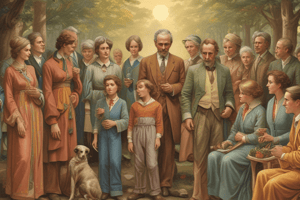Podcast
Questions and Answers
What major sociological theory is Talcott Parsons known for developing?
What major sociological theory is Talcott Parsons known for developing?
- Structural Functionalism (correct)
- Social Constructivism
- Conflict Theory
- Symbolic Interactionism
Which component is NOT part of Parsons' 'AGIL' framework?
Which component is NOT part of Parsons' 'AGIL' framework?
- Latency
- Adaptation
- Integration
- Legislation (correct)
How did Parsons define a social system?
How did Parsons define a social system?
- A collection of disparate political ideologies
- An economic structure dictating social behavior
- A set of interconnected elements such as groups and institutions (correct)
- A set of independent individuals forming a community
What aspect of social behavior did Parsons emphasize in his role theory?
What aspect of social behavior did Parsons emphasize in his role theory?
What was one criticism of Parsons' work?
What was one criticism of Parsons' work?
What did Parsons contribute to the concept of social action?
What did Parsons contribute to the concept of social action?
Which of the following works is attributed to Talcott Parsons?
Which of the following works is attributed to Talcott Parsons?
In which area did Parsons believe culture plays a significant role?
In which area did Parsons believe culture plays a significant role?
Which of the following was a legacy of Parsons' work in sociology?
Which of the following was a legacy of Parsons' work in sociology?
What aspect of social values did Parsons specifically focus on in his theories?
What aspect of social values did Parsons specifically focus on in his theories?
Flashcards are hidden until you start studying
Study Notes
Overview of Talcott Parsons
- American sociologist (1902-1979).
- Major figure in 20th-century sociology; known for the development of structural functionalism.
Key Concepts
-
Structural Functionalism:
- Society is a complex system of interrelated parts.
- Each part (institution or process) contributes to the stability and functioning of the whole.
-
Action Theory:
- Parsons emphasized the importance of individual actions within social structures.
- Proposed the "AGIL" framework to understand social systems:
- Adaptation: How systems cope with their environment.
- Goal Attainment: Setting and achieving collective goals.
- Integration: Maintaining cohesion among parts of society.
- Latency (Pattern Maintenance): Preserving cultural values and norms.
-
Social System:
- Defined as a set of interconnected elements (groups and institutions).
- Focused on how values and norms shape social behavior.
-
Role Theory:
- Examined how individuals fulfill roles within social contexts.
- Stressed the importance of socialization in understanding behavior.
-
Cultural System:
- Considered culture as integral to social systems.
- Emphasized the role of shared symbols and meanings.
Contributions
- Developed the concept of "social action" and its relation to societal norms.
- Influenced the study of sociology through his systemic framework for understanding social phenomena.
- Authored significant works, including "The Social System" and "The Structure of Social Action".
Criticisms
- Accused of being overly deterministic and neglecting individual agency.
- Faced critique for focusing primarily on stability and consensus, ignoring social change and conflict.
Legacy
- Established foundational ideas for sociology and influenced subsequent theorists, including those who challenged or expanded upon his theories.
- His work remains significant in discussions of social theory and methodology.
Overview of Talcott Parsons
- Renowned American sociologist active from 1902 to 1979.
- Key figure in 20th-century sociology recognized for structural functionalism.
Key Concepts
-
Structural Functionalism:
- Views society as a system of interrelated components.
- Each institution or process plays a role in maintaining societal stability.
-
Action Theory:
- Highlights the significance of individual actions within a social framework.
- Introduced the "AGIL" framework:
- Adaptation: The system's ability to adjust to environmental challenges.
- Goal Attainment: The process of establishing and reaching shared objectives.
- Integration: Ensuring cohesion and cooperation among society's elements.
- Latency (Pattern Maintenance): Upholding cultural traditions and societal norms.
-
Social System:
- Describes a network of interconnected entities (groups and institutions).
- Explores how societal values and norms inform behaviors.
-
Role Theory:
- Investigates how individuals perform specific social roles.
- Emphasizes the critical function of socialization in shaping behavior.
-
Cultural System:
- Views culture as a crucial aspect of social systems.
- Stresses shared symbols and meanings as foundational to social interactions.
Contributions
- Pioneered the "social action" concept linking individual actions to societal norms.
- Advanced sociology through a systemic approach to understanding social phenomena.
- Authored influential works like "The Social System" and "The Structure of Social Action".
Criticisms
- Criticized for being excessively deterministic and downplaying personal agency.
- Faced opposition for concentrating on stability and consensus while neglecting social change and conflict.
Legacy
- Laid the groundwork for contemporary sociology, influencing later theorists both supportive and critical of his ideas.
- His theories remain vital in ongoing debates regarding social theory and research methodologies.
Studying That Suits You
Use AI to generate personalized quizzes and flashcards to suit your learning preferences.




